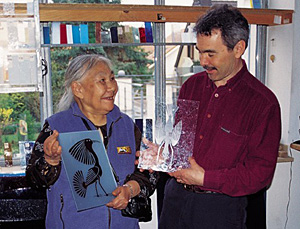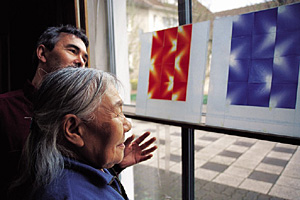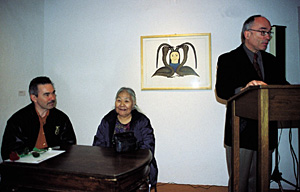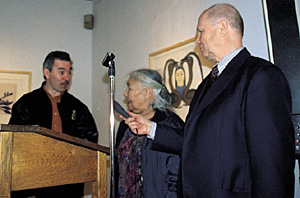 |
........................................................ |
| |
Canada’s
new Territory Nunavut five years old
Kenojuak Ashevak as Representative of Nunavut at German-Canadian
Anniversary Celebrations in Germany
First major exhibition of this renowned Inuit artist in
Germany
By Ansgar Walk
The works of Kenojuak Ashevak have long been a feature
in many major museums in the world; her pictures and stone
carvings are much sought after by collectors and they
obtain high prices; her designs adorn Canadian postage
stamps and coins. On February 1, 2004, the first exhibition
of her works in Germany was opened at Burg (Castle) Vischering.
This was one of the reasons why the 77 year old artist
made her first visit to Germany from March 25 to April
4, 2004. Together with Jimmy Manning, the print studio
man-ager of the West Baffin Eskimo Co-operative Cape Dorset,
she came primarily as an ambassador of her homeland to
the celebrations here for the 5th anniversary of the Ca-nadian
territory of Nunavut.
Preliminary remarks
The 5th anniversary of the foundation of Canada's youngest
territory, Nunavut, was celebrated on April 1, 2004, by
the German-Canadian Association (DKG) at a central event
in the Ger-man capital Berlin and also in various regional
groups, the aim being to make this Inuit self-administrated
territory more widely known in Germany.
Independently of this, but simultaneously, the Münsterland
Museum Burg Vischering, Lüdinghausen (Coesfeld District)
presented February 1 thru May 9, 2004, the first exhibition
in Germany of 40 works by the 77-year-old, internationally
highly respected Inuit artist Keno-juak Ashevak (artist
name: Kenojuak) from Cape Dorset (Kinngait). The exhibition
was enti-tled "Kenojuak – Works of an Inuit
Artist from the Collection of Ansgar and Ulrike Walk".
To supplement this extensive art exhibition the museum
presented 20 large-format color photographs from relevant
publications by the author Ansgar Walk, giving additional
impres-sions of Nunavut, the artist's home region (March
22 thru May 9, 2004). Several events with lectures on
this topic completed the program. At the end nearly 10,000
visitors had seen the exhibition.
Kenojuak Ashevak and print studio manager Jimmy Manning
were invited to all these cere-monial occasions as the
territory's official representatives by the German-Canadian
Associa-tion on the recommendation of the Commissioner
of Nunavut, the Hon. Peter Irniq. For their stay in Germany,
the two Inuit were supported financially by the Canadian
Embassy in Ger-many and by Alcan Europe, Bombardier Transportation,
the German-Canadian Association and ourselves as collectors,
who also succeeded in getting the acceptance of the invitation.
Throughout their stay in Germany the guests were looked
after by Ricky, my wife, and me – longstanding friends
to both of them. Print press, broadcast and TV stations,
and internet paid tribute in advance and showed further
interest during this visit.
Kenojuaks’s Journey through Germany
Paderborn – Visit of a Suitable Glass Workshop
During the preparations for the visit we learnt from Terry
Ryan of Dorset Fine Arts Toronto and Jimmy that Kenojuak
was dealing with a quite new kind of project: designing
a large window for the John Bell College Chapel near Toronto.
Jimmy had therefore asked if it would be at all possible
to include in the program the visit of a suitable glass
workshop.
Regarding this new project the journey through Germany
started with an informative visit of several hours on
March 26, 2004 at “Glasmalerei Peters” in
Paderborn, an art workshop for glass painting and mosaic
since 1912.
The encounter was so stimulating that we agreed on a further
meeting for the last day of the tour, April 3. And so
Kenojuak's German official program was concluded with
another visit to "Glasmalerei Peters".
The visit was followed by two interviews with regional
newspapers.
 |
„Glasmalerei
Peters“ –
Kenojuak and Jimmy with gifts of glass pictures
based on Kenojuak motifs
|
 |
Glasmalerei
Peters“ –
Kenojuak Ashevak and Jimmy Manning admiring modern
glass art
|
Exhibition in Burg Vischering
On March 28 the two Inuit guests honoured the present
exhibition in Burg (Castle) Vischering (Westphalian Cultural
Centre of the District of Coesfeld), the first exhibition
of Kenojuak’s art work in Germany at all, by their
visit for several hours.
After general words of welcome, among other things from
District representative Mrs. Ann Dabbelt and from Jean
Fredette (Councellor Cultural Affairs) as representative
of the Cana-dian Embassy in Germany, I took over to moderate
the previously announced discussion be-tween Kenojuak
and the audience. I was assisted by Jimmy Manning, who
translated from English to Inuktitut. The hall was now
so full that many of those present had to stand.
More than 200 enthusiastic visitors had come from far
and wide to spend the night in the small Münsterland
town of Lüdinghausen. They included gallerists from
Germany and Ger-man speaking countries, there to see and
talk to the artist.
Kenojuak, still born in an igloo, grown up in nomad camps
and never been to school, who had lived for many years
in an arctic settlement with 1,300 souls, calmly answered
the ques-tions and patiently signed her biography, for
sale in the museum shop, and many postcards of her works.
From time to time she looked at me with a twinkle in her
eyes as if to ask: "How am I doing?"
Kenojuak’s attendance and the exhibition of her
art work met with an overwhelming re-sponse in German
media (print press, broadcast on radio, TV).
 |
Burg
Vischering: Introduction to the event (March 28,
2004) – Jimmy Manning, Kenojuak Ashevak and
Counsellor Jean Fredette
|
 |
Burg
Vischering: Panel discussion –
Jimmy Manning, Kenojuak Ashevak and Dr. Ansgar Walk
|
Nunavut Celebrations in Hamburg and Berlin
Two days later Kenojuak, Jimmy, Ricky and myself travelled
by train to Hamburg where our Inuit guests attended an
evening event, a Nunavut anniversary celebration, arranged
by the German-Canadian Association in the Ethnology Museum.
A highly informative introduction to "Nunavut"
by Consul Michael Scott-Harston from Canada's Hamburg
Consulate was fol-lowed by my brief talk on the life and
work of the artist Kenojuak Ashevak; then I moderated
a round-table discussion involving Kenojuak, Jimmy and
the Consul on questions put by the rapted audience of
more than 30 people.
Next day a train journey to Berlin was scheduled, and
in the following morning, April 1, Kenojuak and Jimmy
were expected at a discussion on "The Inuit Today"
at the John F. Ken-nedy Institute for North American Studies
at the Free University of Berlin, organized by Dr. Petra
Dolata-Kreutzkamp. Aside from the host Institute assistant
and ourselves, some students of history, Professor emeritus
for Geography Dr. Karl Lenz and Dr. Peter Bolz, the Curator
of Berlin's Dahlem Museum for Ethnology, were taking part.
More than 200 people were waiting when we arrived with
Kenojuak and Jimmy, the two guests of honor and official
representatives of Nunavut, at the official anniversary
celebration "5 years of Nunavut – Land of the
Inuit" organized by the German-Canadian Association
in the Ethnology Museum in Berlin-Dahlem. The program
lasted longer than 5 hours: remarks by Heidrun Richter,
Executive Member for Cultural Affairs of the German-Canadian
Associa-tion, a welcoming address by Minister-Counsellor
Chris Greenshields from the Canadian Em-bassy, then a
short slide show and talk by me on the artist Kenojuak,
her life and work, and to conclude the first part a panel
discussion with myself and the two guests of honor, moderated
by Christian Richter of the German-Canadian Association.
The program continued with a reading of Inuit myths by
the actor Wolfgang Condrus, a paper on “Nunavut”
by Counsellor David Ehinger and finally a lecture by Professor
Karl Lenz, John F. Kennedy Institute of the Free University
of Berlin, on the geography and general develop-ment of
the new territory.
Second Visit at “Glasmalerei Peters”
in Paderborn
The official program of the Kenojuak’s journey ended
with the scheduled second visit at “Glasmalerei
Peters” in Paderborn on April 3. The head of the
company welcomed the guests personally and made himself
available for several hours to answer their questions.
As a gift he presented Kenojuak and Jimmy two glass panels.
They show in different techniques two of Kenojuak’s
designs with expressive effects.
Is this the start of a fruitful artistic cooperation?
|
|
|
|